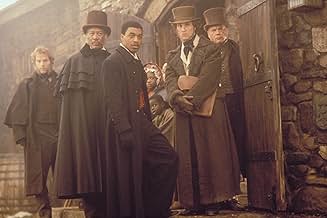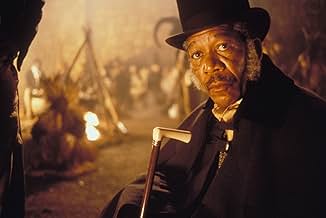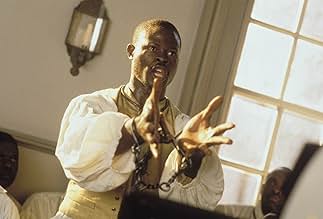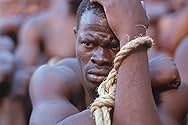En 1839, una revuelta de cautivos en un barco español causa gran controversia en los Estados Unidos. Cuando el barco es capturado en las costas de Long Island, los tribunales deben decidir s... Leer todoEn 1839, una revuelta de cautivos en un barco español causa gran controversia en los Estados Unidos. Cuando el barco es capturado en las costas de Long Island, los tribunales deben decidir si los hombres serán esclavos o legalmente libres.En 1839, una revuelta de cautivos en un barco español causa gran controversia en los Estados Unidos. Cuando el barco es capturado en las costas de Long Island, los tribunales deben decidir si los hombres serán esclavos o legalmente libres.
- Dirección
- Guionista
- Elenco
- Nominado a 4 premios Óscar
- 11 premios ganados y 44 nominaciones en total
- Lieutenant Meade
- (as Darren Burrows)
- Dirección
- Guionista
- Todo el elenco y el equipo
- Producción, taquilla y más en IMDbPro
Opiniones destacadas
Amistad shows this terrible business better than any other film I've ever seen. It portrays all the horrors: the capture of Africans at the hands of rival tribes; the abusive loading of slaves onto ships; the deplorable conditions; the murder and violence conducted in the name of economics; the hopelessness of the slaves' position; the crass indifference felt by the traders, auctioneers, owners and passers-by. Spielberg pulled few punches, only darkening the worst scenes to keep it from degenerating into some Rob Zombie horror film (thereby retaining an audience).
The film also does a good job with the portrayal of the heroes, the slaves who fought for their freedom aboard the schooner Amistad. You can really feel their anger, confusion, and frustration as the events unfold. They are a people pushed from one holding cell to another, subjected to trials and procedures incomprehensible to them (both for language barriers and for the inanity of it all).
One part the filmmakers did a fine job with was the communication barrier. Some of the best scenes involve the ignorance of the Connecticut gentry as they stare blankly at the Africans as they speak their tongue; incompetent linguists stating the obvious and disguising it as "science"; lawyers trying to figure out the slaves' stories; and finally the leader of the escaped Africans declaring "Give us free!" That part really stood out for me.
There are a few criticisms I can lay upon this film, however. Firstly, they didn't do that great of a job in portraying courtroom drama. Filmed in '97, this film predates some great television courtroom dramas (Law & Order, The Practice). Much of what happens in court is either boring or confusing or pointless. I think if Spielberg was able to study some of these great courtroom dramas, these parts would have had a lot more "punch". Having said that, Anthony Hopkins did some fine delivery as John Quincy Adams...
Another element I disliked was the clumsy interweaving of the "Big Slavery Picture" elements. There's a scene at President Van Buren's state dinner where Senator John Calhoun of South Carolina shows up and makes threats of civil war. The scene was really just thrown in there to try to put in some jeopardy, but the film was doing just fine without that. The intrigue between Van Buren and the Spanish girl queen was really nice, however (a very young Anna Paquin!).
The last element that didn't work too well was Morgan Freeman's character, Joadson. He really comes across as little more than an extra. He's such a fine actor, the script doesn't do him justice.
For the most part, this is a fine, and important, film. It just misses a few marks that would have made it a great film.
8 out of 10.
Starting with the positives, the best things are the production values, coupled with the handsome and evocative period detail and the rich, searing cinematography there are some really arresting images here, and the sensational debut of Dijimon Hounsou, a performance of blistering passion and grave sensitivity.
Throughout, especially in the first three-quarters, 'Amistad' boasts moments that are harrowing (the brutal voyage of the slaves), powerful (the opening scene) and moving (most of the film). The script is well-intentioned and thoughtful, if sometimes a bit over-sentimental and heavy-handed (especially Adams' big speech, that could have been stirring but didn't seem to know how far to go to make its obvious point, so it felt preachy). Much of Spielberg's direction is impeccable, with enough of what makes his direction so great in his best films.
Hounsou isn't the only great actor here. Anthony Hopkins gives his all in an authoritative and stirring account of Adams and Matthew McConaughey shows more engagement and charisma than he does in some of his later films. Morgan Freeman is underused but is as you expect.
On the other hand, 'Amistad' is a long film (not a bad thing necessarily), but could have been about 20 minutes shorter with less characters and some of the final act being trimmed. Some of the latter part of the film drags, and the score disappointingly is over-emphatic and gives a heavy-handedness. Despite being brilliantly delivered by Hopkins and clearly written with thought and good intent Adams' big speech just went too far making its point.
In conclusion, a brave attempt at bringing a significant, if not as well known, event to film that works very well in a lot of elements but just misses the mark of completely working as an overall film. 7/10 Bethany Cox
That is, in essence, what Steven Spielberg's gripping drama "Amistad" is about. Through its various dramas, Spielberg presents a case about a group of Africans, who, after being seized from their home, were forced onto a ship and sent to the United States aboard "La Amistad". On their way there, the slaves, led by Cinque (Djimon Hounsou), rebelled, killing off part of the crew. However, the ship was still directed towards the United States, where the Africans were brought to trial under murder.
In the court, various factions claim ownership of the slaves, and therefore try to seize them away. The United States government, led by President Martin Van Buren (Nigel Hawthorne), and Secretary of State Secretary Forsyth (David Paymer), try to ship the Africans to Spain, where an 11 year old Isabella II (Anna Paquin) wants them back. The two Spaniards who own "La Amistad" want the slaves for themselves. The American ship that found the slaves also wants them. In the midst of this are two abolitionists (Stellan Skaarsgard and Morgan Freeman), who want the slaves to be free. They enlist the help of lawyer Matthew McConaughey, who tries to free them. Through various legal proceedings, the case appears before the Supreme Court, where it is argued by ex-President John Quincy Adams (Anthony Hopkins).
The film itself is a visual wonder. Spielberg favorite Janusz Kaminski sets the film in a dark, somber mood when appropriate, and a visual setting when appropriate as well. At times, the film is very slow, and very methodical. Spielberg is not at his finest here, the courtroom scenes have a tendency to lag. But Spielberg's finest work in the film, the opening scene, a scene of Cinque's family, and the brutal voyage of the slaves to America, is altogether stunning. It is this emotional force that carries the film. McConaughey is superb as the lawyer defending the Africans, Hopkins is sensational as the old Adams, Freeman is outstanding when used (Spielberg vastly under uses his supreme talents), and the rest of the cast is stellar. The movie, however, belongs to Hounsou. His emotional intensity is brilliant. Spielberg manages to make even the slowest scenes sparkle with focus on Hounsou, and the film's extraordinary power is simply captivating. The film is flawed, for most of the supporting characters are merely cardboard. But that doesn't matter. The story is a gripping one, and one of extreme importance. Kudos to Spielberg for finding it, finding the right men for the job, and letting the audience listen to the words of Cinque. A good job all around. ***1/2 out of 4, or an 8 out of 10.
Why is it un-Spielberg? Ponderous pacing replaces storytelling fluidity and speed, his normally active camera is replaced by more painterly compositions.. Instead of having stuff jump at you, you have to search for it or feel it without truly realizing it: touches of genius are very present, but differ from the original style (like the brutal insurrection scenes, cargo dumping scene, etc).
The story itself focuses on a mutiny aboard a transatlantic slave ship, led by Cinque. The ship is intercepted by the American navy and a messy trial ensues to see who has rights regarding the cargo, Spain, America... or are the slaves not "legal" slaves after all? Cue abolitionists hiring young property lawyer Baldwin. These events, based on facts, occur before the Civil War.
I can feel people sighing from here. "Oh, no: not a courtroom drama...". Labelling it as such would be missing the point by a mile. It is so much about context and moral ambiguity, and ultimately the tragic ridicule of the situation. Amistad is also a technical marvel. Janusz Kaminski's (SPR, Schindler's List, AI, Minority Report...) photography is superb, a dark study in sepia browns. The acting is magnificent, mainly two amazing performances. One by Anthony Hopkins as former president John Quincy Adams (an unusual turn for him, where he really soars), and the other by Djimon Hounsou (later cast as Juba in Gladiator) as Cinque being the true gem.
Ultimately, Amistad's greatest strength is that it avoids offering any easy answers and in that sense, does to subconscious issues about race and slavery what Kubrick's 2001 did to space travel and progress, albeit with more humanity and more accessible drama. It's a shame this film is never talked about.
¿Sabías que…?
- TriviaSir Anthony Hopkins astounded the crew by delivering the entire seven-page courtroom speech in a single take. Steven Spielberg was so in awe, he couldn't bring himself to call him Tony, and insisted on addressing him as Sir Anthony throughout the shoot.
- ErroresMartin Van Buren was never photographed while in office, and in 1839 photography was extremely new technology and not widespread. The first president to be photographed while in office was Van Buren's immediate successor William Henry Harrison in March 1841. Van Buren was photographed in 1845, well after he had left office, but he was not wearing a sash as depicted in the movie. Former Presidents John Quincy Adams and Andrew Jackson were also photographed that same year.
- Citas
John Quincy Adams: [to the Court] This man is black. We can all see that. But can we also see as easily that which is equally true: that he is the only true hero in this room? Now, if he were white, he wouldn't be standing before this court fighting for his life. If he were white and his enslavers were British, he wouldn't be standing, so heavy the weight of the medals and honors we would bestow upon him. Songs would be written about him. The great authors of our times would fill books about him. His story would be told and retold, in our classrooms. Our children, because we would make sure of it, would know his name as well as they know Patrick Henry's. Yet, if the South is right, what are we to do with that embarrassing, annoying document, The Declaration of Independence? What of its conceits? "All men created equal," "inalienable rights," "life, liberty," and so on and so forth? What on Earth are we to do with this? I have a modest suggestion.
[tears papers in half]
- Créditos curiososThe events depicted did not historically occur at Fort El Morro
- Versiones alternativasThe board of film censors of Jamaica have excised the opening scenes, depicting a violent slave uprising on a ship, from all copies of the film released in Jamaican theatres.
- Bandas sonorasAndante From Quartet No. 2 In B Flat Major
Written by Giovanni Battista Viotti
Performed by Quartetto Aira
Courtesy of Dynamic SRL.
Selecciones populares
- How long is Amistad?Con tecnología de Alexa
Detalles
- Fecha de lanzamiento
- País de origen
- Idiomas
- También se conoce como
- Chuyến Tàu Nô Lệ
- Locaciones de filmación
- Productoras
- Ver más créditos de la compañía en IMDbPro
Taquilla
- Presupuesto
- USD 36,000,000 (estimado)
- Total en EE. UU. y Canadá
- USD 44,229,441
- Fin de semana de estreno en EE. UU. y Canadá
- USD 4,573,523
- 14 dic 1997
- Total a nivel mundial
- USD 44,229,441
- Tiempo de ejecución2 horas 35 minutos
- Color
- Mezcla de sonido
- Relación de aspecto
- 1.85 : 1





































